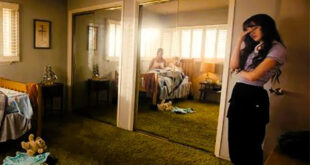“I am who I am because of my dad, for better or for worse.” Dr. Gregory House’s words at his father’s funeral, uttered with poignancy, bitterness, and resignation in an achingly honest performance by Hugh Laurie is but one of so many memorable lines from last night’s episode of House, MD, “Birthmarks” but one that resonates deeply throughout this beautifully written and performed episode. "Birthmarks” is likely to be remembered as one of the best episodes of the entire series.
We are marked from birth by either nature or nurture to be who we become as adults. House’s patient, indelibly and physically marked from infancy by pins inserted into her brain by her birth parents, making her an addict, nearly killing her as an adult. And House, too, is marked (more emotionally than physically) by not only his father’s brutality but, perhaps less obviously, by his father’s drive and sense of calling. And for better or worse, House is perhaps more like his father than he would care to admit, but the opposite of his father in so many meaningful ways.
The death of House’s father John not only provides a structure for exploring House’s troubled relationship with his father, but also gives rise to House’s very welcome (and highly anticipated) reconciliation with his best friend Wilson. The entire episode — from this week’s patient, an adopted Chinese woman searching China for her birth parents, to the funeral (and the fabulous the road trip getting there), to House’s wonderful reconciliation with Wilson — was absolute perfection.
We know House’s relationship with his dad was troubled, even eliciting extreme avoidance on House’s part when his parents visited in season two. He told Cuddy then that he hated his father. But House’s reluctance to attend the funeral borders on pathological, and only when Cuddy sneakily doses him, knocking him out, can she and Wilson (who has come back, he says, only out of respect for House’s mother) actually get him on the road.
House acts like a petulant child in his avoidance of the funeral once he regains consciousness, and in several calculated moves tries to make his escape, as it is, of course, one’s duty to try to escape one’s captors. (House certainly must be a fan of the film The Great Escape, after all. Vive la France, indeed!) But no matter House’s efforts, Wilson does hold all the cards, coming prepared for the worst — always. He knows how House thinks and has made every effort to keep him en route to the funeral. After all, Wilson is the one guy who can beat House at poker. So he controls House’s meds, his cane, even his phone, knowing that somehow House will try employ them (if he can) to escape the inevitable.
Of course part of that is House’s obsession with games and gamesmanship. And Wilson clearly has the upper hand in this game. But I also think part of it is fear, even though John House is dead and can no longer hurt his son, or gnaw at the many scars he bears.
One of House’s “escape” attempts triggers an arrest — and brilliant revelation of (as Doris Egan calls it) House and Wilson’s superhero origin story. Wilson, it seems, is wanted in Louisiana for vandalism, a warrant that goes back many, many years.
The incident occurred in the midst of Wilson’s first divorce at a medical conference. As Wilson drinks at a bar, he becomes annoyed when another patron (surprisingly, not House) plays a particular Billy Joel song over and over. This provokes Wilson to hurl a bottle through an antique mirror, inciting a bar fight and further mayhem. House, who has witnessed the incident, bails Wilson (at that point a complete stranger) out of jail, calling a lawyer for him and working out a deal. But Wilson didn’t realize he still had to attend court, and when he didn’t show up, leaving Louisiana, he became a fugitive from justice. Oops. Was House’s act one of random kindness, as Wilson later suggests? House dismisses it (as he would), but part of me knows that House does do things like that from time to time, and at an earlier age, before “the leg,” who knows? After telling the story to the local sheriff, and with Louisiana unwilling to pay the cost of pursuing this ancient warrant, Wilson and House are set free and continue their journey to Lexington.
So, all escape attempts having failed, House and Wilson do make it to the funeral. The look on House’s face as they pull up to the funeral home signals his abject fear of being there. Being there is suddenly too real, and going inside to not only face his mother Blythe, but his father’s friends — and speak — is a burden to which House must resign himself. When his mother calls upon him, House looks like he wants the earth to open and swallow him. But, sighing, and encouraged by Wilson, he slowly makes his way to the podium. And no one, not Wilson, not Blythe, and certainly none of us in the audience know what House will say.
He begins, his voice serious and slightly halting, noting the presence of his father’s Marine Corps colleagues, but no one who had served under or ranked below his dad. This is no surprise to House. “If the test of a man is how he treats those he has power over,” says House, bitterly, “then it was a test my father failed. This man we are here to pay homage to was unable to admit any point of view but his own. He punished failure.” House continues his bitter indictment before stopping himself, gaining control of his powerful emotions. The bitterness of House’s words are both punctuated and mitigated by sadness in House’s devastated eyes.
As House speaks honestly, bitterly, sadly and emotionally about his father, we are given rare insight into how his father’s influence helped to form Gregory House, the doctor and the human being. Is House’s brutal honesty, his harshness and abrasiveness (to everyone) an echo back to his father? But House reserves his harshest treatment for people in authority; for those who abuse their own power over the vulnerable. He’s blunt with his patients and doesn’t pull his punches, but when confronted with patients who are really powerless, really vulnerable, House usually reacts with seemingly uncharacteristic compassion. House’s practice is in some ways the ultimate haven for the powerless. His is the medical court of last resort for the dying; his patients are those who have been rebuffed, and passed along from doctor to doctor, landing on his doorstep.
According to House, his father would not consider any but his own viewpoint. And for all of his ego and supposed arrogance, House is actually ego-free when it comes to accepting opposing theories. House encourages opposing viewpoints, willing to dismiss even his own theories for a better, more likely, theory as long as it pushes the case forward. And where his father punished failure, House does not (although his fellow may not agree with this contention). In his medical practice, House wants his fellows to succeed, not fail, yet when they come up short, he may push them and needle them, but he doesn’t punish either failure or mistakes (in action or judgment). For all of things done by Chase in the first couple of seasons, for all of the times Foreman, Chase and Cameron went above House’s head to undermine (or stop) him, he has never been vindictive. Never punished. And has even respected them for it.
As House continues his eulogy, he steers it into safer terrain. As he does so, I think that House comes to an understanding that not all he acquired from his father necessarily wrecked him. And whether through nature or nurture (and we do learn that it’s nurture in this case), House’s own drive and sense of mission are owed to his father as well. “He loved doing what he did; he saw his work as some kind of sacred calling… more important than any personal relationship.” House could as easily be describing himself, and the words clearly resonate.
“If he were a better father, I might be a better son. But I am who I am because of him. For better or worse.” And when House breaks off, beginning to lose control over his emotions, he begins to say “If only my dad…” you wonder what it was he wanted to say. “If only my dad…” what? What was House thinking? House turns away and approaches the casket. Kissing his father on the forehead, he pulls out a nail clipper and grabs a sample for DNA testing.
Of course, House’s completely Housian action leaves viewers wondering about the sincerity of his tearful farewell to dad. Was House as overcome as he appeared? In my interview with the episode’s writers, Doris Egan and David Foster suggested that the scene starts out one way, but then unleashes a trap door, leaving you wondering what House was really feeling, really saying, and how much was sincere. I believe that House was sincere up until the moment he grabbed the sample. He had no reason to actually kiss his father. And although House is a really, really good actor (not as good as Hugh Laurie, of course), the action seems too spontaneous (although clearly he grabbed the clippers from Wilson, who had them in his bag, at some point). I think House was hoping for an opportunity and took it; but I do think his emotions and his outburst were genuine expression of the conflict that has raged in him for years.
“Birthmarks” is about the relationships we choose and those we do not choose: House’s relationship with his father (and his mother); his relationship with Wilson — and an adopted woman’s own troubled search to find her biological parents. Of the three central relationships in the episode, only House and Wilson's relationship comes full circle and begins to repair. For the patient, the truth is so terrible (that her parents tried to kill her as an infant, and refuse to recognize her as their child many, many years later) her adoptive parents plead with House’s staff not to tell the emotionally fragile young woman.
For House, learning that the brutal John House was not his biological father (something that House has believed since he was an adolescent) gives him no comfort, no solace. He feels neither vindication nor closure, something that, in itself, troubles House, as Wilson observes in the episode’s poignant final scene. But, in the end, with Wilson firmly back both in his hospital position — and in his position as House’s best friend, House is able to confide his grief, as one can only do with a very close friend. And House stops in his tracks as if realizing it for the first time. “My dad is dead.” Those words, uttered quietly, brokenly, almost regretfully, suggest that House is keenly aware of his loss, perhaps even his lack of closure. It’s an emotion that seems to surprise him, if not Wilson (who does understand that House has an emotional life, even as House denies it).
But unlike House’s relationship with his father, his relationship with Wilson is reparable. And something House cherishes and wants desperately to save. And does. What a beautiful episode in a season of them. House returns next Tuesday with a new episode.
 Blogcritics The critical lens on today's culture & entertainment
Blogcritics The critical lens on today's culture & entertainment




This is really good! Congratulations!:)